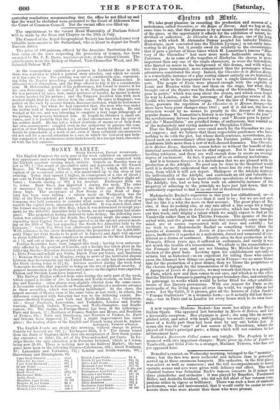igtritrto Ant 31111.51r.
We take great pleasure in recording the production and success of a melodrama, called Genevieve, or the Reign of Terror. And we beg at the same time to say, that this pleasure is by no means founded on the merits of the piece, or the opportunity it affords for the exhibition of talent, in- dividual or collective. le Chevalier de in Maison Rouge, one of the long dramas with which M. Alexandre Dumas peopled his unlucky Theatre Historique, (now converted into the Theatre Lyrique,) is tolerably inte- resting in its plot, but it greatly owed its celebrity to the circumstance that it gave a picture of those times which M. Lamartine's famous "His- tory of the Girondins" had once more made fashionable among the Parisians. As in some of the tragedies of lEschylus the chorus is more important than any one of the single characters, so were the Girondists, who figured en masse in the background of this drama, and with whose fate the piece terminated, more remembered than the personages whose adventures constituted the story. Indeed, the Chevalier de la Mauro» Rougc is a remarkable instance of a play resting almost entirely on its historical interest, while in the foreground there is not a single historical figure of note. The people of Paris were pleased enough with the exploits of Louis and Maurice while they saw them on the stage, but what they brought out of the theatre was the death-song of the Girondins, "Mourn pour la pabie," which was sung about the streets, and which soon found its way to London, under the patronage of that peculiar avatar of St. Cecilia who invented the barrel-organ. Now the law of France, we be- lieve, prevents the repetition of Le Chevalier de in Maiaon Rouge,—for there have been great changes since 1847; and if it did not, the law of attraction would by no means be greatly in the favour of this once popular drama. M. Lamartine's history is no longer the " livre du jour"; the revolutionary fervour has passed away ; and " Mourir pour la patrie" and the "Marseillaise" are petrified forms of enthusiasm, that remind us of the melancholy and raving madness of Theophilus Cibber.
That the English populace ever cared much for the Girondins we can- not suppose ; and we believe that those respectable gentlemen who have nothing to do with the plot, but whose death-sentence, nevertheless, pro. duced such an extraordinary effect upon the Parisian public, seem to the Londoners little more than a row of well-dressed dummies. The Chevalier de la liaison Rouge, therefore, comes before us without the benefit of that historical association which was its chief support. But it has some good bustling tableaux, and these are well enough done to create an average degree of excitement. In fact, it passes off as an ordinary melodrama.
And it is because Genevieve is a melodrama that we are pleased with its production at the Adelphi. No good can be done in the theatrical world until it is distinctly understood that each house has its own line of busi- ness, from which it will not depart. Shakspere at the Adelphi destroys the individuality of the Adelphi, and confounds an old and valuable es- tablishment with some of the most abortive speculations of modern times. The Adelphi, too, had so long been such an admirable instance of the propriety of adhering to the principle we have just laid down, that we particularly regretted to find it on our list of theatrical heretics.


























 Previous page
Previous page